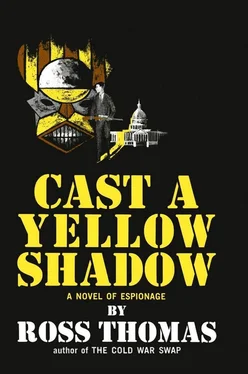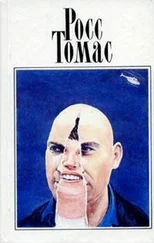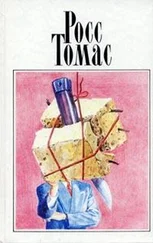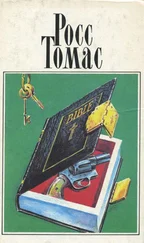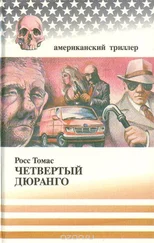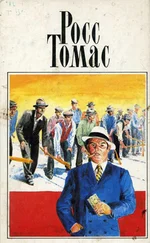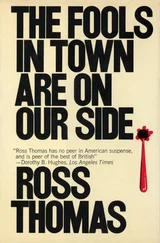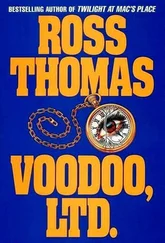“You’re not clear,” Padillo said.
“You’re Mr. Padillo, aren’t you? I saw you from a distance in Lomé.”
“I’m Padillo, you’re Underhill, and he’s McCorkle. We know why we’re here. We don’t know why you are.”
He smiled faintly; there was just a touch of humor in it. “I’m usually more coherent, but the trip was exhausting.” He was a slight man, about fifty, with small bones and long grey hair combed back. The tweed suit he wore looked old and worn and rumpled. He fumbled in one of his jacket pockets and produced a pipe and a pouch of tobacco. “Do you mind if I smoke?” he asked. He wore glasses with gold rims and his pale blue eyes turned to each of us as he asked the question. His voice sounded British.
“Go ahead.” There was no use rushing him. He would tell it in his own time and his own way.
He got the pipe going with three matches. “Perhaps I should first summarize it all for you and then supply the details. There are certain fellow citizens of mine who have financed my trip here. They are members of that small minority of reason which I mentioned — at least we like to think that we are.” He puffed away on his pipe some more.
“My mission here is really quite simple: I’m to prevent Mr. Padillo from assassinating the Prime Minister.”
I turned to Padillo and couldn’t keep the exasperation out of my voice. “It was going to be a conspiracy of three, you said, but an official, revised estimate later put it at six: just Van Zandt and a few cronies, you said. Now we’re well past six with the rest of Underbill’s precinct still to be heard from. Christ, this is no conspiracy; it’s a convention.”
“I didn’t sign on to be clairvoyant,” Padillo said. “Just clever.”
“I’m edgy.”
“I notice.”
He pulled a chair over by Underhill, sat down on it, and lighted a cigarette. “You saw me in Lomé?”
The thin man nodded through a haze of pipe tobacco that mingled with the smoke from Padillo’s cigarette. His blue eyes blinked rapidly behind his glasses. “At the hotel just after they talked to you.”
“You know them?”
“Grew up with them.”
“And you think they tried to hire me to kill your Prime Minister?”
“Know it for a fact.” He puffed away on his pipe some more, and then used it to gesture with. “You see, Mr. Padillo, the white community in my country is very small — around a hundred thousand or so. People in government tend to compose an even smaller community. It might be called a minor establishment. We’re not very good at this espionage business, you know. Haven’t had the experience, for one thing. But the information about you was obtained from what I believe is usually described as an unimpeachable source.”
“What was the source?”
This time the blue eyes fairly twinkled. “My wife,” Underhill said and grinned and went on hurriedly: “You remember the chap who called on you at the hotel in Lomé and said his name was Kraus. He was the taller of the two, pretended to be German and later admitted that he was really the Minister of Transport?”
“I remember him,” Padillo said.
“Well, the poor fellow simply couldn’t bear to keep the adventure to himself. Went back and told his wife the whole thing after making her swear a black oath of secrecy.”
“But she talked?”
“Of course.”
“To whom?”
“To her sister — my wife.”
Padillo got up and walked around the room. “Can we order some liquor up here?” he asked me.
“Just pick up the phone and tell room service to send up a fifth and some ice.”
He picked up the phone and placed the order. Then he turned to Underhill again.
“You said you saw me in Lomé — from a distance. Why were you in Lomé?”
“I was keeping an eye on the pair that approached you. Mr. Padillo, I must again stress that ours is a small white community among some two million natives. There are a number of us who are determined that the entire country shall not be plunged into social and economic chaos because of the stubbornness and hatred and even cruelty of other whites. We have collected a sum of money — some of us donated savings, others of us mortgaged property — and we intend to use this fund to prevent that old fool Van Zandt from becoming a martyr. If you were to kill him, it would send us headlong into a blood bath. I’m a professor of Romance languages at our university, so I may not be skilled at the proper way to go about conducting such negotiations as these, but I am prepared to offer you seventeen thousand pounds not to kill Van Zandt. It may not be as much as they are offering, but it is all we could raise. If you reject our offer and accept the assassination assignment, then I must discover a way of killing you.”
“Why don’t you just go to the police?” I said. “Or to the FBI. Has everybody stopped taking from them?”
“That must be an Americanism,” Underhill said.
“Sort of,” Padillo said.
“To be perfectly honest, I haven’t been to your police or FBI because we simply don’t want them — or anyone in your government — to learn about the plot right now. It’s weird enough as it stands, but if your government were to discover the details, they would approach the Prime Minister when he arrives. He would deny the entire thing, and that would be the end of it.”
“You see, gentlemen, we want the attempt to be made, but we want it to fail. Even more important, we must obtain proof that the plot was hatched, directed and paid for by Van Zandt and his supporters. We are prepared to offer you the seventeen thousand pounds to do this for us, Mr. Padillo — and Mr. McCorkle, of course.”
“Your friends in Lomé made a similar proposition,” Padillo said. “They said they’d kill me if I didn’t assassinate the Prime Minister. They made that promise after I turned down their previous proposition involving a sum of dollars which amounted to somewhat more than you’re offering.”
Underhill nodded his head. “Yes, they’re a bloodthirsty lot. I must confess that I have no idea about how I’d go about doing it. Killing you, I mean. What is their latest offer?”
“They’ve offered to kill my wife if Padillo doesn’t kill Van Zandt,” I said. “They’ve kidnapped her.”
“Dear me. That does put you in an awkward position, doesn’t it?”
There was a knock on the door and Al, the room-service waiter, bustled in with the bottle of Scotch, the glasses and the ice. He wanted to know how we were and we told him we were fine. Padillo signed the check and Al went out the door trailing a string of “Thank you, sirs” behind him. I poured the drinks and asked Underhill if he wanted ice in his. He said no.
“Mr. Underhill,” Padillo said. “I have no intention of killing your Prime Minister.”
“Delighted to hear it. Although I must say that you have a most impressive record in that sort of thing.”
“What makes you think so?”
“There was this chap from Berlin who looked us up and offered to sell us the same information that he’d sold Van Zandt’s people. Charged us two hundred pounds. Lord knows how much Van Zandt and that crowd paid. The information was about you — a rather extensive dossier, I should add. Mr. McCorkle was mentioned, too. You owned a restaurant together in Bonn, I believe.”
The conversation was skittering from topic to topic. Either Underhill was a first rate dissembler, or he had one of the least organized minds I’d run across. I tried to get back on a pertinent course. “Mr. Underhill, do you have any idea who has my wife and where they may be keeping her?”
“I can probably make a very good guess as to who has her. There’s a chance that I can give you some information as to where she’s being held. But it would seem that’s a rather good bargaining point for me, wouldn’t you say?”
Читать дальше
